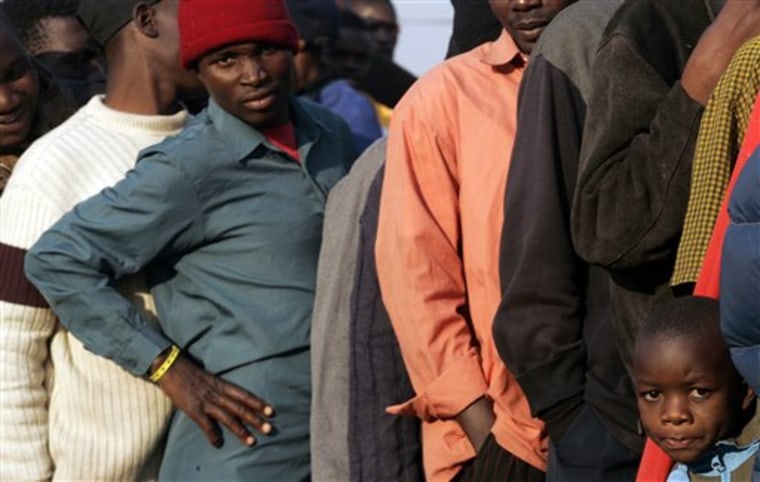Thousands forced from their homes by anti-foreigner violence in South Africa are now reportedly threatened by disease in makeshift camps, and some immigrants said Friday they felt safer hiding in open fields.
Neighboring Mozambique, meanwhile, declared a state of emergency to free government funds for citizens fleeing attacks. South African police reported sporadic violence — but no deaths — across the country Friday, leaving scores more homeless.
At least 42 people have been killed and more than 25,000 foreigners displaced since attacks began earlier this month by South Africans who blame immigrants for crime and unemployment. More than 500 arrests have been made.
The situation in and around Johannesburg, where the worst violence broke out, was calmer Friday. But aid workers say there are now fears about the spread of disease among the thousands who have taken shelter from the winter cold at police stations, churches and other temporary camps.
Cape Town police spokesman Billy Jones said about 400 people had sought shelter on a motor racetrack after 12 people were injured in overnight attacks on an informal settlement in Cape Town.
"The area is quiet now but we are maintaining a visible presence," he said, adding that many of the displaced had been moved to various community centers and town halls.
Medical concerns surface
Bianca Tolboom, a nurse with the international aid organization Medecins Sans Frontieres, said camps were overcrowded and there was concern about access to clean drinking water.
"Some people have been staying in the open air with not sufficient blankets, so now the main medical concerns are respiratory tract infections and diarrhea," she said.
In Zandspruit, a dusty township in northern Johannesburg, a group of Malawians gathered to discuss whether to flee to the nearest police station, or spend another cold night hiding in the bushes near their homes.
The Malawians had heard rumors about the police station: that their belongings would be stolen, that they'd have to bribe police for protection, that they'd be deported.
As a military helicopter flew overhead, they decided to spend another night muffling their babies' cries in the bushes. They put their faith in another rumor: that military troops, which they hadn't yet seen, would keep them safe.
Thabo Masebe, spokesman for Gauteng province, which includes Johannesburg, said authorities were identifying land where tents could be erected as temporary shelters.
Mozambique issues state of emergency
Predicting an escalating "exodus," Mozambique Foreign Minister Oldemiro Baloi said the state of emergency had been declared Thursday night as thousands of Mozambicans flooded across the border.
Baloi said about 10,000 people had returned on their own while 620 people arrived in the Mozambican capital Thursday in buses arranged by the consulate in Johannesburg.
The Mozambican government has released money and aid to help those returning. They are being assisted with transport to their home towns as well as clothes, food, blankets and basic cooking implements.
Siobhan McCarthy, spokeswoman for the South African Department of Home Affairs, said traffic was increasing at the borders with Mozambique and Zimbabwe. There have also been reports of buses leaving for Malawi.
On Friday, the United Nations refugee agency expressed concern at the attacks and the plight of affected Zimbabweans.
Tanzanian President Jakaya Kikwete, also chairman of the African Union, expressed dismay at the attacks during a mini-summit in Arusha, Tanzania.
"The general feeling of the summit was of shock and disbelief with the current assaults and killings carried out indiscriminately against foreigners in some parts of South Africa," he said at a news conference. However, he said he was reassured by steps taken by the South African government.
The South African police and the National Prosecuting Authority said in a joint statement Friday that cases will be brought to court as soon as possible.
The prosecuting authority condemned the attacks as "unacceptable and violent," and said it "trusts the courts will deal with these cases with the full might of the law, to send a strong message that condemns this criminal behavior."
However, Human Rights Watch said courts have already dropped several cases because of a lack of evidence and called on South Africa not to deport any victims while their cases are pending.
Many of the victims do not possess correct documentation and are hesitant to participate in the justice process for fear of arrest or deportation, the New York-based organization said in a statement.
"For justice to prevail, South Africa should protect these victims, whose testimony is crucial in bringing their attackers to justice," said Georgette Gagnon, the organization's Africa director. "Deporting the victims will send a clear message that xenophobic violence is above the rule of law."
